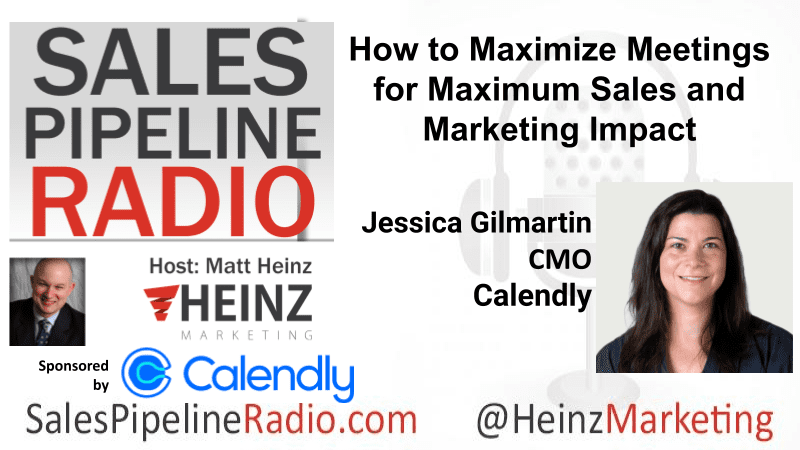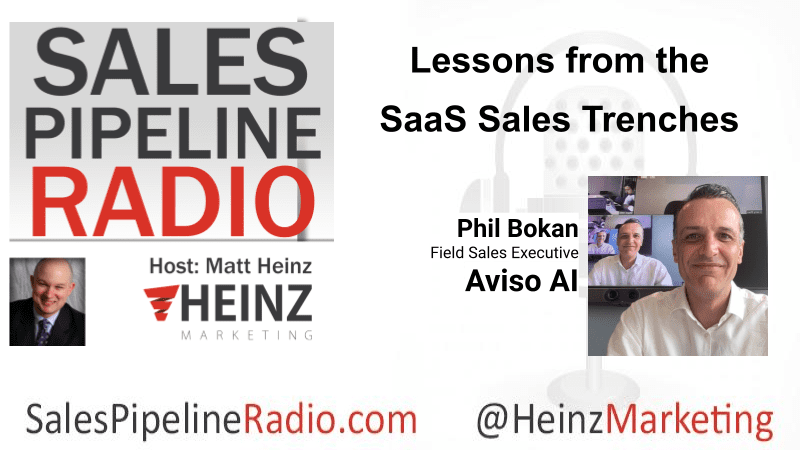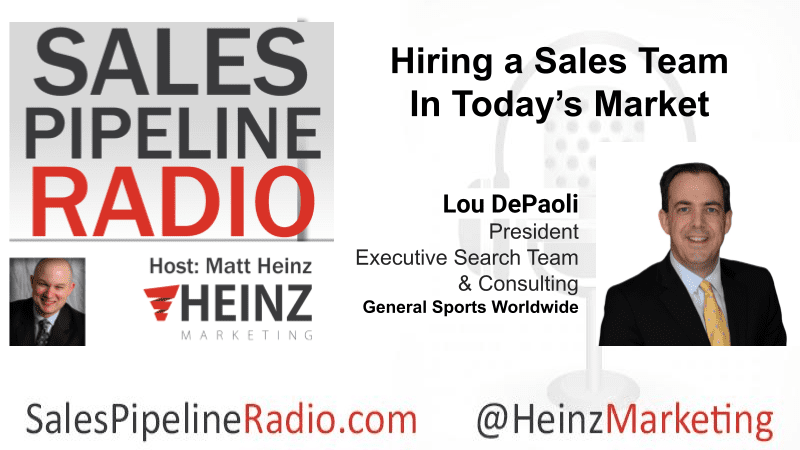Sales Pipeline Radio, Episode 351: Q & A with Jessica Gilmartin

Summary
Matt interviews the best and brightest minds in sales and Marketing on Sales Pipeline Radio.
By Matt Heinz, President of Heinz Marketing
If you’re not already subscribed to Sales Pipeline Radio or listening live Thursdays at 11:30 am PT on LinkedIn (also on demand) you can find the transcription and recording here on the blog every Monday morning. The show is less than 30 minutes, fast-paced and full of actionable advice, best practices and more for B2B sales and marketing professionals.
We cover a wide range of topics, with a focus on sales development and inside sales priorities. You can subscribe right at Sales Pipeline Radio and/or listen to full recordings of past shows everywhere you listen to podcasts! Spotify, iTunes, Blubrry, Google Play, iHeartRADIO, Stitcher and now on Amazon music. You can even ask Siri, Alexa and Google or search on Audible!
This week’s show is entitled, “How to Maximize Meetings for Maximum Sales and Marketing Impact” and my guest is Jessica Gilmartin , CMO at Calendly (see her full bio at the end).
Tune in to Learn:
- Incredible highlights and data from the new 2023 State of Scheduling Report.
- More about the role of meetings, the relevance of AI in productivity, and the potential of AI in revolutionizing the meeting culture in the future.
- The four habits that differentiate successful from non-successful teams – having goal-focused meetings, effective time management, relationship building, and the utilization of AI productivity tools.
- The need for companies to bring in AI for making meetings more productive while also drastically reducing time wasted on scheduling and conducting unproductive meetings.
- Calendly’s new mission! To make meetings fun again
Watch the video, listen in below and/or read the transcript below.
Matt: All right. Welcome everybody to another episode of Sales Pipeline Radio. So excited to have you all here as we round out very quickly here, the end of 2023. My name is Matt Heinz. I’m your host here at Sales Pipeline Radio. Excited to have so many of you here joining live on YouTube and on LinkedIn.
If you are joining us live today, very excited to have you here in the middle of your workday, middle of your work week. You can be part of the show. If you have a comment, a question, a rebuttal, all of it is fair game. Throw those into the comments.
We will see those. We can respond to those. We can bring your comment up on screen. We’ve got a cutting-edge technology here Sales Pipeline Radio to make this interactive. And if you are listening or watching on demand, thank you so much for downloading and subscribing every episode of Sales Pipeline Radio past, present, and future always available at SalesPipelineRadio.Com. Very excited for our topic today. I know we usually only go Jessica, like 20 minutes or so, but I could go for a couple hours on just all the different peeling back the onion on this report. Jessica Gilmartin. She is the CMO Chief Marketing Officer at Calendly. Jessica, thanks for joining us today.
Jessica: Thank you, Matt. Awesome to be here and always excited to talk to you. We always have a great time.
We do have a good time. And I think it gets meaty very quickly as well. I was super excited when I saw The State of Calendaring, a survey you guys published, I think just last month.
And we’ll put a link to that in the show notes. I was so impressed not just about calendaring, it gets into AI, it gets into productivity, it gets into how work gets done. So I wanna dig into a lot of that. But Jessica, maybe start with a little bit about yourself and then how that how that research report came to be.
Jessica: Absolutely. So I have been a Calendly CMO almost exactly a year. So in January, it’ll be a year, which is hard to believe. It’s gone very fast. And I joined Calendly, mainly for the reasons that most people hopefully join companies, because I was wildly excited about the product. Every time I have had a meeting scheduled with somebody that didn’t use Calendly, I was like, why are you not just using Calendly? Why do we have to go back and forth eight times to schedule a meeting? And so it’s always amazing as a marketer, when you get to market and sell a product that you love and passionately believe in and that millions of people also love. And so that’s been a really exciting part of this year and also getting to work with a fantastic team.
So I feel pretty lucky to have this role. I think one of the things that we talked about over the past few months is most people know who Calendly is. And I think what we’re trying to do as marketing team is really help people think about what Calendly could be and the many features that Calendly has and the many ways that we can support people’s actual productivity and helping people’s quality of life through more productivity better meetings, better scheduling.
And so that was really the impetus for The State of Scheduling , it was like, gosh there’s so much interesting information about meetings that’s the lifeblood of most of how we make our money, right? That’s the lifeblood of how we feed our family is usually through meetings. And we figured there’s probably better ways for people to do that.
Matt: And I think part of the reason that meetings have become the lifeblood of a lot of B2B organizations, rightfully so because that’s where we get a lot of work done. It can also be the bane of our existence because of how much time we spend in meetings because of the inefficiency of certain meetings because of, to your point, how long it takes sometimes just to get people coordinated to have a meeting.
Now I will say full disclosure. I am a happy Calendly customer. It was one of the catalysts that helped me move someone who was working as my executive assistant into a different role in the organization for her to be able to thrive and do other things as she built her career, because the calendar just made it so much easier.
We literally schedule Sales Pipeline Radio guests using Calendly. I have some meetings, phones, some meetings, Zoom. I don’t want this to be a commercial, but it’s been really a huge change for me. It was amazing to me looking through the data in this survey and this is this 2023 State of Scheduling Report, what we saw and what the different focus areas were around how much time [00:04:00] people spend wasted time in meetings. Talk a little bit about what you, what we found there and why it’s so important.
Jessica: Yeah. So the people that we typically sell to and the people that kind of are the most prolific users of our product are not surprisingly people like you, solopreneurs, that have so many meetings; recruiters obviously spend huge amounts of time with candidates; customer support folks that are meeting with customers all the time; and salespeople. And so these are people that really truly meetings is the lifeblood of their work and the backbone of their work. And so what we found is that the average person spends up to four hours a week scheduling meetings, which is crazy.
When you think about how, what you can get done in four hours. When I was thinking about it, I was like, British Bake Off is one of my favorite TV shows, and I was like, I could watch four hours of British Bake Off a week versus scheduling, and so there’s just so many things that you could do with your time.
You could work out for four hours. You could have four more hours of meetings. So there’s just an amazing amount of things that you could do with all that wasted time. So fundamentally, I think there’s just this issue of wasted scheduling. And then I think there’s a lot of [00:05:00] really interesting information about meetings themselves and how the people that say that their meetings are better and more productive, they generally are happier and their companies are more successful.
They believe their companies are more successful. And so there’s this really direct link between people feeling more productive, being more productive, and having more productive meetings, and actually seeing that success.
Matt: So I want people to go download this report. As I found it, there were four habits that separated the successful from the non successful teams that I found in the report. One was just goal focused meetings. The more successful teams, had meetings, but they have specific goals for those meetings. And if there weren’t goals, they just didn’t have them.
Two was just time management. 61 percent of successful teams block time to do work to get work done versus only 39 percent of teams that are less successful. The anti meeting, right? It’s a meeting for yourself just to get stuff done so that was a second habit. Third was relationship building. Scheduling time and making time to build those workplace relationships, especially in a virtual environment.
And the fourth, which I want to go a little deeper on is the use of AI productivity tools. 52 Percent of successful teams were more curious about how those tools can drive more meeting efficiency versus only 28 percent of those who were less successful. So those were four habits that I pulled out.
And let’s dig a little further on the AI side, because I think meeting productivity, deciding whether you should have a meeting to begin with, who should be in that meeting, who’s going to get the most out of that meeting. Boy, there’s a lot of AI I can do for that. And we’re already seeing the impact that’s happening.
Unpack that a little bit for us as well.
Jessica: Absolutely. And I think what’s really interesting is I, and I’m curious your perspective, it feels a little bit like we’re at the peak of the AI hype cycle. And so another thing that we saw in the survey was that virtually everybody was really interesting and excited about AI so 90 plus percent of people were really interested. The majority have not actually used AI and so what I think is really interesting, and I think we’re on the cusp of us actually understanding how AI will be used and incorporated and integrated within the tools that we already use. So I believe that AI is just gonna be something that we gradually see over time infuse more and more of the work that we’re already doing, and more and more of the tools that we’re already using. And so I don’t know that we’re going to see this huge movement away from our existing tools and into new AI tools. What I think is going to happen is all of the products and the technology and the tools we’re already using will just have more and more intelligent AI features.
And I think within a couple of years, it will be so ingrained in what we do, we won’t even realize it’s AI anymore.
Matt: I think we’re already getting there a little bit, right? ChatGPT is just over a year old, at least in terms of being publicly available, but AI is embedded in so many of the tools we use today to make them smarter, to make them more intelligent.
That’s only going to increase over time talking today on Sales Pipeline Radio with Jessica Gilmartin. She’s the CMO at Calendly, and we’re talking about a bunch of great concepts and insights that came out of their 2023 State of Scheduling Report. As you referenced earlier, 94 percent of go to market professionals reported in the survey they’re curious about a AI’s impact on their job in 64%, the majority, six out of 10, almost two thirds have yet to experiment at all with new AI tools, including ChatGPT. Why is that? It’s not just the hype cycle, right? I think it’s a reticence to even look into it. What do you think is driving that?
Jessica: I can just speak for myself, and also I speak to so many other sales and marketing leaders. I think it just feels really overwhelming, number one. And I think there feels like a disconnect between what you hear in the news about the possibilities and the excitement and all the expectations and what’s actually being delivered right now.
And so I think one of the things that we see is, my team spends huge amounts of time thinking about AI tools, we examine them, we investigate them. And a lot of times we leave feeling like this is a nice to have, and there’s the elements of it that are really interesting. And we struggle to figure out what’s the transformational workflows here.
What are the things that are actually going to drive such big business value that we’re willing to change or replace our existing workflows? And I think that’s where we’re like stuck a little bit. And there are a few tools that we’re using. There are a few AI tools that we’re using that actually have been transformational and we’re willing to change our workflows, but I think those are few and far between. And I think that’s what most people are seeing.
Matt: I think so too. And I think that, oftentimes like we get enamored with the status quo because it’s what we’re comfortable with. And when big changes come about, we worry about how that’s going to disrupt, not just our workflow, but our lives.
And yes, the people that I’ve seen lean in the most with AI, both in our company and with clients and elsewhere are those that realize that robots are taking over the things you didn’t want to do anyway. When I was an intern at a PR firm, thousands of years ago, one of my jobs was to create briefing books for media tours that clients were going on and it was a manual effort.
There was barely the internet at the time, right? that just automatically is created. No intern wants to actually spend their time doing that. Everyone wants to spend their time on more creative things that require the human brain, require creativity to get done.
I think this ties into meetings as well, because so often there are things that are discussed in meetings. There are meetings scheduled for certain things where the proverbial, this could have been an email. This isn’t just about scheduling. This is about the productivity of the meeting itself.
Is there a scenario, Jessica, where meetings could even be fun again?
Jessica: Calendly just change our mission, which I’m really excited about just a couple of months ago. And our mission is to create a world where people actually love meetings. And I love that mission because meetings have such a bad rep because they in general, they’re such a productivity killer.
And mainly because people typically don’t think about the meeting experience. They don’t think about the pre meeting experience, the during meeting experience and the post meeting experience. And so I think that, that when I look at our schedules, people spend 20 to 30 hours a week in meetings. It’s an enormous amount of time on meetings.
And when you’re spending the majority of your work week doing work that you don’t perceive as valuable, they’re not fun and people don’t want to do it. And that’s why people always say Hey, let’s do less meetings. But when you think about the meetings that are productive, you think about the best meetings of your week where people come in with a clear agenda where every the right people are in the room, you have very clear talking points. You have clear action items. You leave the meeting and everybody has clarity around what are next steps. That is a beautiful meeting where you actually get things done. And I think everybody would look at that and say, that’s the gold standard. That’s what every single meeting should look like.
There is nothing worse than going to a meeting where you just go in, you’re like, wait a minute who’s called this meeting? Who’s starting this meeting? What’s the point of this meeting? You leave and you’re like, who took notes for this meeting? And that happens like way more often than it should, but it still happens all the time.
Matt: How is the importance or role of meetings changed now that we’re all working from wherever now, right? Some people going back to the office, a couple of days a week, maybe some folks have that hybrid role, but a lot of folks are increasingly working remotely. Meetings valuable from a productivity standpoint, they’re valuable just in terms of building a community at your company. Taking a couple of minutes just to do small talk as you enter and exit the room when we’re doing Zooms, that isn’t as natural as it used to be, but talk about the role and the difference in doing meetings now, more virtually than in person.
Jessica: So I think there’s two flavors of meetings as I think about it. There’s the internal meetings and then there’s external meetings. So when I think about internal meetings… my last company obviously went virtual during COVID, we came back to the office. Calendly is 100 percent virtual. And so I’ve seen both sides of it.
And I’d say there is a massive communications tax in being a fully virtual company and it is unavoidable tax. And I think the thing that you really have to think about with meetings, number one, you’re going to just have more meetings. I don’t think it’s possible in a fully virtual environment to have fewer meetings.
One thing that we do a lot of at Calendly actually is we do a lot of async updates. So we do, we use a third party recording tool and we just record a lot of updates. And so for example, if we need a decision made, instead of calling a 30 minute meeting, someone on my team will do a full presentation, record it, send it out and ask for feedback.
That’s a really great way to avoid a meeting. And so we use it pretty heavily here. I think another thing that we do a lot of is just really enforcing this idea that you have to have a very clear agenda. You have to set a brief in advance, give people time to collect feedback, share that. And I think that helps a lot in reducing the friction of these really massive amounts of meetings. I think on the flip side with external meetings, you certainly, you do this a lot, right? You are constantly talking to customers and to prospects. I think when you don’t have that in person aspect, it does make it really hard.
It makes it much, much harder to form those personal connections and to create this feeling of comfort and confidence in you when you’re doing it through a tiny little screen.
Matt: It’s harder, but it’s still entirely possible. You just have to be more intentional about it. When we were all in the office and you knew you were going to bump into people through the hallway, you’re going to bump into people in the kitchenette getting coffee or having lunch, the team building happened on its own.
We have to be more intentional in a virtual environment now as well. I think meetings, whether you’re in person or virtual have taken on a life of their own. And the default response in a lot of cases is, especially remotely, let’s do a meeting and figure this out. It may not be a meeting. Maybe it’s a Slack thread. Maybe it’s someone who actually owns this problem comes up with a perspective first that you debate versus going in and just like hashing it all out. I can see a future of meetings where the AI helps us determine if a meeting is even necessary. What’s the outcome we’re searching for?
What is the objective that we were trying to achieve and what is the right format to get that done? If the meeting is the right format, they’re likely as a way of running that meeting that makes it more productive, right? Where maybe you’ve got AI listening in and saying you’re all going down a rabbit hole, start focus back on the thing at hand.
Seriously, I think about what this could look like to help us focus in the right place to, making meetings fun is one thing, but making them something that actually moves the ball forward productively for ourselves and for organizations, I think that’s where we want to take this.
Jessica: I think to me, one of the biggest issues, too, is as you are working on these really gnarly problems that we have that you can’t resolve in one meeting.
That’s where I’m excited about A. I. Because so much of what happens is you lose a lot of the context from the previous meeting or you forget to bring somebody to the first meeting and then you have to start over again. And you may have a series of six or seven meetings. And you may have lots and lots of different people that are having different conversations.
And so what I would love to see is, the opportunity for there to be threads of meetings and threads of conversations that all come together so that everybody has that same context coming into the meeting and you don’t lose it. You don’t have to start again constantly. And I feel like half of every meeting is just reminding everybody what you have talked about the previous time.
Matt: Yeah, imagine if there was follow up. Imagine if there was accountability. Imagine if, you finish a meeting and what you needed to do immediately, automatically ends up on your to do list.
Jessica: Like scheduling link, imagine that.
Matt: Yeah, exactly. Exactly. It’s pretty awesome. I think, there’s clearly in the data in the State of Scheduling Report, we saw some people that are, a little reticent to dig in on this, but And I saw someone told me, and I don’t remember who it was. They said yeah, AI is coming for your job. It’s going to give you a much better job.
It is going to give you a much better experience. It’s going to help you focus on the things you actually enjoy as part of your job that really challenges. It really lets you dig into what you are uniquely capable of doing and does the rest of it on your behalf to help you be more effective, efficient, and just happier too.
So I think that the future is bright on that front. Jessica, thanks so much for joining us today. Where can people learn more about the 2023 State of Scheduling Report?
Jessica: Just go to calendly.com and look at our resources section. We have that, and you can check in on LinkedIn where we are all over. And I really appreciate you taking the time to chat today.
Matt: Oh my gosh, this has been exciting. So just really appreciate what you guys did with the report. Appreciate you joining what is actually Jessica, our last episode of Sales Pipeline Radio in 2023. We’re going to be dark next week. I got family in town.
We’re going to be dark the week between Christmas and New Year’s. We’ll be back first week of January with our first episode of 2024 until then happy holidays to everyone. Hope you’re spending time with family, friends, doing things you love. Thanks again, Jessica for joining us. We’ll see y’all in the new year.
This has been Matt Heinz on Sales Pipeline Radio. Take care.
Jessica Gilmartin is the Chief Marketing Officer at Calendly, where she’s responsible for leading all aspects of marketing including brand awareness, creative, demand generation, and product marketing.
Jessica brings nearly 20 years of marketing and leadership experience to Calendly. Most recently, she was Head of Revenue Marketing at Asana, where she led demand generation, marketing operations, and product and sales-led growth business integrations for the Americas, EMEA, Japan and APAC businesses. Before Asana, she served as CMO of three high-growth, venture-backed startups, building their global enterprise marketing engines during rapid growth periods, including Honor, one of the largest privately-owned home care companies in the U.S., and Piazza, an online college recruiting platform where she also led sales to build it into a multi-million dollar revenue-generating company in one year. Previously, she co-founded Fraiche Yogurt, a successful chain of yogurt stores in the Bay Area.
Jessica received a Bachelor of Science in Industrial and Labor Relations from Cornell University and a Master of Business Administration in Marketing and Strategy from The Wharton School at The University of Pennsylvania
Listen to the Latest Episodes:
Matt interviews the best and brightest minds in sales and Marketing. If you would like to be a guest on Sales Pipeline Radio send an email to Sheena@heinzmarketing.com.



